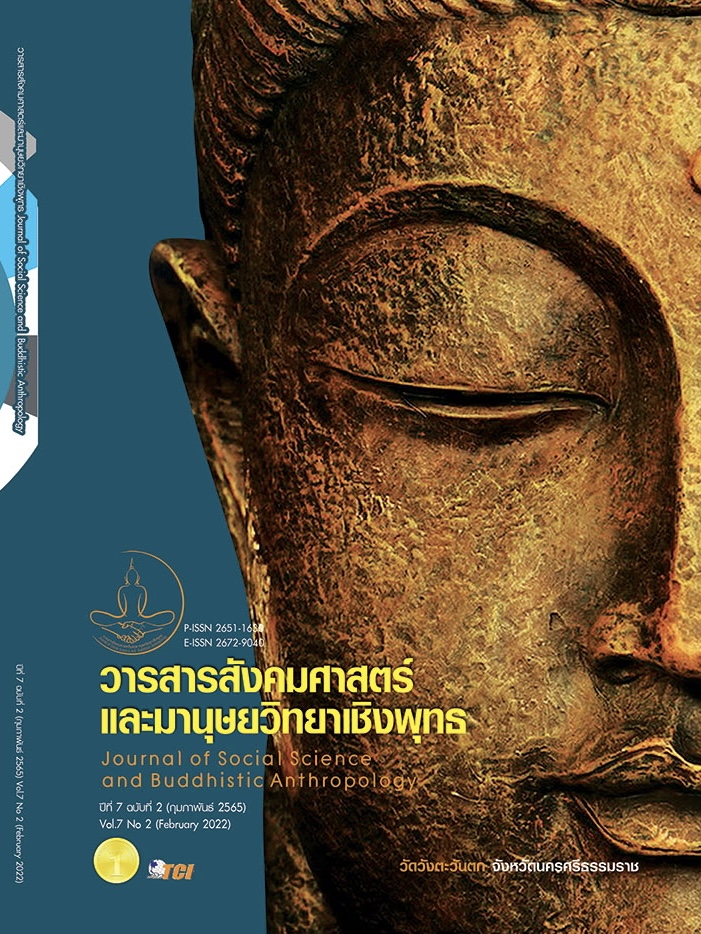การจัดการการเรียนรู้ตลอดชีวิตเพื่อพัฒนาคุณลักษณะผู้เรียนไทยยุค 4.0
คำสำคัญ:
การเรียนรู้ตลอดชีวิต, การพัฒนา, ยุค 4.0, คุณลักษณะผู้เรียนบทคัดย่อ
บทความฉบับนี้มีวัตถุประสงค์ดังนี้ 1) ศึกษาสภาพการจัดการ และ 2) จัดทำข้อเสนอแนะแนวทางการจัดการการเรียนรู้ตลอดชีวิตเพื่อพัฒนาคุณลักษณะผู้เรียนไทยยุค 4.0 เป็นการวิจัยแบบผสานวิธี กลุ่มตัวอย่างที่ใช้ในการศึกษา เป็นครู ผู้บริหารสถานศึกษา ผู้ปกครองและชุมชน สังกัดสำนักงานคณะกรรมการการศึกษาขั้นพื้นฐาน สำนักงานคณะกรรมการการอาชีวศึกษา สำนักงานส่งเสริมการศึกษานอกระบบและการศึกษาตามอัธยาศัย และสำนักงานคณะกรรมการส่งเสริมการศึกษาเอกชน ในจังหวัดปราจีนบุรี จำนวน 356 คน ด้วยวิธีการสุ่มแบบหลายขั้นตอน ดำเนินการ 2 ขั้นตอน 1) ศึกษาโดยใช้แบบสอบถาม ผลการตรวจสอบเครื่องมือมีค่าความเชื่อมั่นทั้งฉบับเท่ากับ 0.991 วิเคราะห์ข้อมูลโดยใช้โปรแกรมสำเร็จรูปทางสถิติ และ 2) การสนทนากลุ่ม โดยการสนทนากลุ่มผู้ทรงคุณวุฒิ 10 คน ผู้เชี่ยวชาญ 15 คน คัดเลือกจากผู้มีประสบการณ์ ความรู้ ความเชี่ยวชาญในด้านการจัดการศึกษาตั้งแต่ 5 ปีขึ้นไป ด้วยการวิเคราะห์เนื้อหา ผลการวิจัย พบว่า 1) สภาพการจัดการการเรียนรู้ตลอดชีวิตเพื่อพัฒนาคุณลักษณะผู้เรียนไทย ทุกด้านมีการปฏิบัติอยู่ในระดับมาก โดยเรียงลำดับได้ดังนี้ 1) การวัดและประเมินผลการเรียน 2) คุณลักษณะผู้เรียนรู้ตลอดชีวิต 3) ผู้บริหาร 4) ผู้สอน 5) นโยบายและกลไกการบริหารจัดการ 6) บุคลากรและภาคีเครือข่ายที่สนับสนุน 7) การสนับสนุนและให้บริการการเรียนรู้แก่ผู้เรียนและผู้สอน 8) ด้านการจัดหลักสูตร และ 9) การจัดการเรียนการสอน 2) แนวทางการจัดการการเรียนรู้ตลอดชีวิตเพื่อพัฒนาคุณลักษณะผู้เรียนไทยยุค 4.0 พบว่า มีองค์ประกอบ 7 ด้าน ดังนี้ 1) นโยบายและการจัดการ 2) การจัดหางบประมาณและทรัพยากรสนับสนุนการเรียนรู้ 3) การจัดกิจกรรมการเรียนรู้ 4) การประเมินผลและเทียบโอนความรู้ 5) การเข้าถึงและการมีส่วนร่วม 6) คุณภาพผู้เรียนรู้ตลอดชีวิต และ 7) คุณลักษณะผู้เรียนรู้ตลอดชีวิต
เอกสารอ้างอิง
กระทรวงศึกษาธิการ. (2560). แผนการศึกษาแห่งชาติ 2560-2574. กรุงเทพมหานคร: สำนักงานเลขาธิการสภาการศึกษา.
กานต์ธีรา ภูริวิกรัย. (2563). การศึกษาโลกในศตวรรษที่ 21: ระบบยังเหลื่อมล้ำ การเรียนรู้ยังวิกฤต. เรียกใช้เมื่อ 27 มีนาคม 2563 จาก https://www.the101.world/global-education
กำจร ตติยกวี. (2558). การประชุมระดับโลกว่าด้วยการศึกษา ณ เมืองอินชอน สาธารณรัฐเกาหลี. กรุงเทพมหานคร: กลุ่มสารนิเทศ สำนักความสัมพันธ์ต่างประเทศ สำนักงานปลัดกระทรวงศึกษาธิการ.
เกรียงศักดิ์ เจริญวงศ์ศักดิ์. (2543). ปั้นสมองของชาติ. กรุงเทพมหานคร: ซัคเซส มีเดีย.
ชูศักดิ์ เอื้องโชคชัย อาชัญญา รัตนอุบล และสุวิธิดา จรุงเกียรติกุล. (2559). คุณลักษณะการเป็นบุคคลแห่งการ เรียนรู้ตลอดชีวิตของเยาวชนไทย. วารสารครุศาสตร์, 44(4), 63-80.
ดิเรก พรสีมา. (2560). ครูไทย 4.0 มติชนออนไลน์. เรียกใช้เมื่อ 4 พฤศจิกายน 2559 จาก https://www.matichon.co.th/news/345042
ดุษณี ดำมี. (2557). การศึกษาตลอดชีวิต: พัฒนาสังคมไทยสู่สังคมแห่งการเรียนรู้. วารสาร Mahidol R2R e-Journal, 1(2), 12-30.
บุญชม ศรีสะอาด. (2545). การวิจัยเบื้องต้น. (พิมพ์ครั้งที่ 7). กรุงเทพมหานคร: สุวีริยาสาส์น.
ปิยะ ศักดิ์เจริญ. (2558). องค์ประกอบสำคัญที่ช่วยส่งเสริมการเรียนรู้ตลอดชีวิต. วารสารครุศาสตร์, 43(2), 141-156.
ศักรินทร์ ชนประชา. (2562). การศึกษาตลอดชีวิต. วารสาร AL-NUR บัณฑิตวิทยาลัย, 14(26), 159-175.
สภาพัฒนาเศรษฐกิจและสังคมแห่งชาติ. (2563). องค์การเพื่อความร่วมมือทางเศรษฐกิจและการพัฒนา Organization for Economic Co-operation and Development หรือ OECD. เรียกใช้เมื่อ 26 พฤษภาคม 2563 จาก https://www.ryt9.com/s/nesd /42724
สมจิต แกนสีแก้ว และคณะ. (2559). ความเสมอภาคและโอกาสการเรียนรู้ตลอดชีวิตสู่การสร้างคุณภาพชีวิต. วารสารราชพฤกษ์, 14(3), 10-17.
สำนักงานคณะกรรมการการศึกษาขั้นพื้นฐาน. (2558). แนวทางการจัดทักษะการเรียนรู้ในศตวรรษที่ 21 ที่เน้นสมรรถนะทางสาขาวิชาชีพ. กรุงเทพมหานคร: สำนักบริหารงานการมัธยมศึกษาตอนปลาย.
สำนักงานจังหวัดปราจีนบุรี. (2561). แผนพัฒนาจังหวัดปราจีนบุรี (พ.ศ. 2561–2564). เรียกใช้เมื่อ 26 มีนาคม 2563 จาก http://www.prachinburi. go.th/PriD-plan. htm
สำนักงานเลขาธิการสภาการศึกษา. (2552). สภาวะการศึกษาไทย ปี 2550/2551 ปัญหาความเสมอภาคและคุณภาพของการศึกษาไทย. (พิมพ์ครั้งที่ 2) . กรุงเทพมหานคร: ห้างหุ้นส่วนจำกัด วี.ที.ซี. คอมมิวนิเคชั่น.
สำนักงานเลขาธิการสภาการศึกษา. (2561). แนวโน้มภาพอนาคตการศึกษาและการเรียนรู้ของไทยในปี พ.ศ. 2573. กรุงเทพมหานคร: สำนักงานเลขาธิการสภาการศึกษา กระทรวงศึกษาธิการ.
อนันท์ งามสะอาด. (2553). ประสิทธิภาพ (Efficiency) และประสิทธิผล (Effective) อาชีวศึกษาจังหวัดสมุทรปราการ. สมุทรปราการ: วิทยาลัยเทคนิคกาญจนาภิเษก.
Cropley, A. J. & Dave, R. H. (1978). Lifelong Education and the Training of Teachers: Developing a Curriculum for Teacher Education on the Basis of the Principles of Lifelong Education. Hamburg: UNESCO Institute for Education.
Henske, J. & Portmofield, P. (2002). Characteristic Elements and Accompanying Performance Indicator for Lifelong Learning. UNESCO : Institute for Education.
Honey, P. (2001). An Identikit picture of a lifelong learner. Retrieved 2001 18, September , from http://www.peterhoney.com/article/70
Johnston, C. (1981). Leadership and The Learning Organization in Self Managing Schools. Victoria: University of Melbourne.
Knapper, C.K. & Cropley, A.J. (2000). Lifelong Learning in Higher Education. London: Kogan Page Limited.
Krejcie, R. V. & Morgan, D. W. (1970). Determining Sample Size for Research Activities. Educational and Psychological Measurement, 30(3), 607-610.
Learning Australia Inc. (2001). Lifelong Learning. Retrieved July 21, 2001, from http://www.aia.asn.au/lll/g8.htm
Livneh, C. (1988). Characteristics of Lifelong Learners in the human service professions. Adult Education Quarterly, 38(3), 149-159.
Shuping, M. (2002). Promoting Lifelong learning in Beijing for a Learning SocietyCarolyn Medel – Anouevo (editor). UIE. Hamburg: Germany: UNESCO.
Stufflebeam, D. L. (1971). Educational Evaluation and Decision – Making. Itasca. Illinois: Peacock.
ดาวน์โหลด
เผยแพร่แล้ว
รูปแบบการอ้างอิง
ฉบับ
ประเภทบทความ
สัญญาอนุญาต
ลิขสิทธิ์ (c) 2022 วารสารสังคมศาสตร์และมานุษยวิทยาเชิงพุทธ

อนุญาตภายใต้เงื่อนไข Creative Commons Attribution-NonCommercial-NoDerivatives 4.0 International License.









